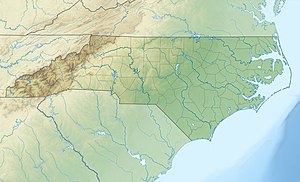Rutledge Creek (Ararat River tributary)
Appearance
| Rutledge Creek Tributary to Ararat River | |
|---|---|
| Location | |
| Country | United States |
| State | North Carolina |
| County | Surry |
| Physical characteristics | |
| Source | Silverleaf Creek divide |
| • location | about 0.5 miles southwest of Slate Mountain Church |
| • coordinates | 36°31′57″N 080°30′55″W / 36.53250°N 80.51528°W[1] |
| • elevation | 1,600 ft (490 m)[2] |
| Mouth | Ararat River |
• location | about 3 miles southeast of Mount Airy, North Carolina |
• coordinates | 36°27′12″N 080°34′54″W / 36.45333°N 80.58167°W[1] |
• elevation | 957 ft (292 m)[2] |
| Length | 9.17 mi (14.76 km)[3] |
| Basin size | 8.35 square miles (21.6 km2)[4] |
| Discharge | |
| • location | Ararat River |
| • average | 12.67 cu ft/s (0.359 m3/s) at mouth with Ararat River[4] |
| Basin features | |
| Progression | Ararat River → Yadkin River → Pee Dee River → Winyah Bay → Atlantic Ocean |
| River system | Yadkin River |
| Tributaries | |
| • left | unnamed tributaries |
| • right | unnamed tributaries |
| Bridges | Blue Hollow Road, Palm Tree Lane, Blues Creek Trail, Rutledge Trail, NC 89, Reeves Mill Road, US 52 |
Rutledge Creek is a 9.17 mi (14.76 km) long 2nd order tributary to the Ararat River in Surry County, North Carolina.
Course
[edit]Rutledge Creek rises on the Silverleaf Creek divide about 0.5 miles southwest of Slate Mountain Church and then flows southwest to join the Ararat River about 3 miles southeast of Mount Airy, North Carolina.[2]
Watershed
[edit]Rutledge Creek drains 8.35 square miles (21.6 km2) of area, receives about 48.2 in/year of precipitation, has a wetness index of 317.01, and is about 63% forested.[4]
See also
[edit]References
[edit]- ^ a b "GNIS Detail - Rutledge Creek". geonames.usgs.gov. US Geological Survey. Retrieved 19 September 2020.
- ^ a b c "Rutledge Creek Topo Map in Surry". TopoZone. Locality, LLC. Retrieved 19 September 2020.
- ^ "ArcGIS Web Application". epa.maps.arcgis.com. US EPA. Retrieved 19 September 2020.
- ^ a b c "Rutledge Creek Watershed Report". US EPA Geoviewer. US EPA. Retrieved 19 September 2020.


